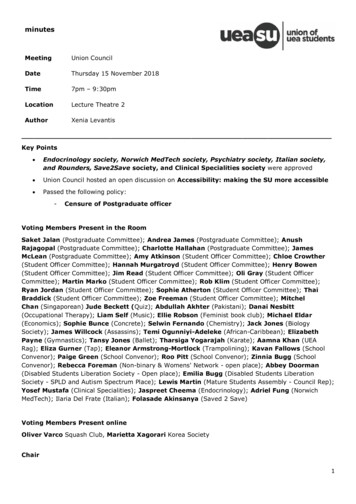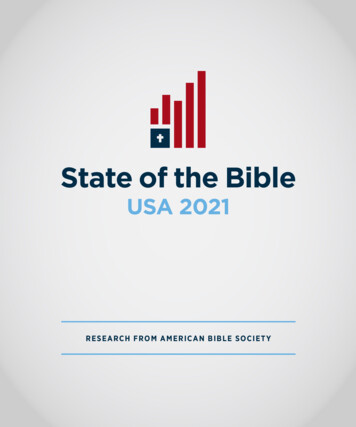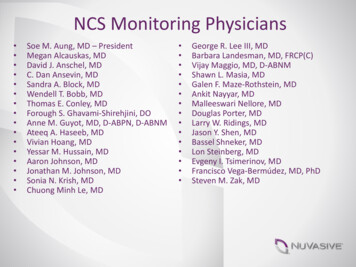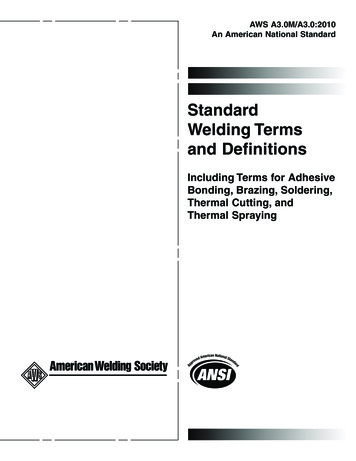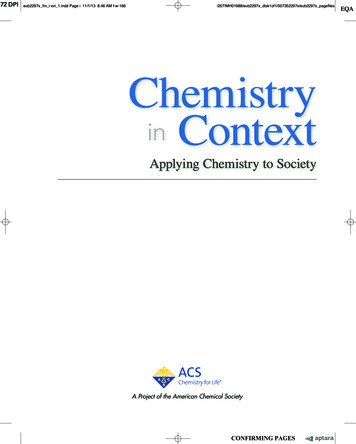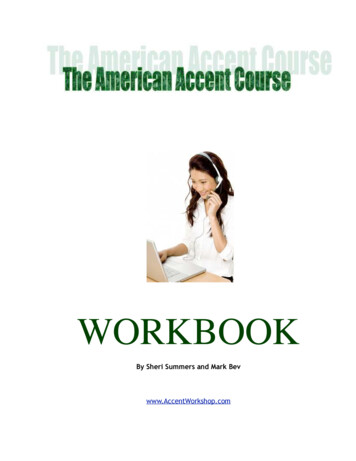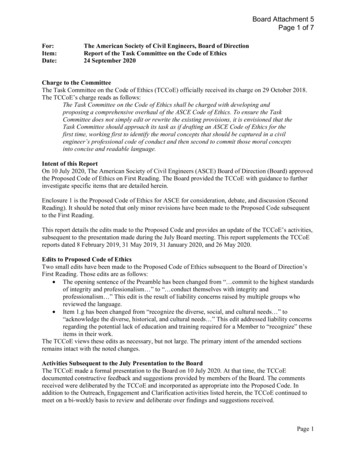
Transcription
Board Attachment 5Page 1 of 7For:Item:Date:The American Society of Civil Engineers, Board of DirectionReport of the Task Committee on the Code of Ethics24 September 2020Charge to the CommitteeThe Task Committee on the Code of Ethics (TCCoE) officially received its charge on 29 October 2018.The TCCoE’s charge reads as follows:The Task Committee on the Code of Ethics shall be charged with developing andproposing a comprehensive overhaul of the ASCE Code of Ethics. To ensure the TaskCommittee does not simply edit or rewrite the existing provisions, it is envisioned that theTask Committee should approach its task as if drafting an ASCE Code of Ethics for thefirst time, working first to identify the moral concepts that should be captured in a civilengineer’s professional code of conduct and then second to commit those moral conceptsinto concise and readable language.Intent of this ReportOn 10 July 2020, The American Society of Civil Engineers (ASCE) Board of Direction (Board) approvedthe Proposed Code of Ethics on First Reading. The Board provided the TCCoE with guidance to furtherinvestigate specific items that are detailed herein.Enclosure 1 is the Proposed Code of Ethics for ASCE for consideration, debate, and discussion (SecondReading). It should be noted that only minor revisions have been made to the Proposed Code subsequentto the First Reading.This report details the edits made to the Proposed Code and provides an update of the TCCoE’s activities,subsequent to the presentation made during the July Board meeting. This report supplements the TCCoEreports dated 8 February 2019, 31 May 2019, 31 January 2020, and 26 May 2020.Edits to Proposed Code of EthicsTwo small edits have been made to the Proposed Code of Ethics subsequent to the Board of Direction’sFirst Reading. Those edits are as follows: The opening sentence of the Preamble has been changed from “ commit to the highest standardsof integrity and professionalism ” to “ conduct themselves with integrity andprofessionalism ” This edit is the result of liability concerns raised by multiple groups whoreviewed the language. Item 1.g has been changed from “recognize the diverse, social, and cultural needs ” to“acknowledge the diverse, historical, and cultural needs ” This edit addressed liability concernsregarding the potential lack of education and training required for a Member to “recognize” theseitems in their work.The TCCoE views these edits as necessary, but not large. The primary intent of the amended sectionsremains intact with the noted changes.Activities Subsequent to the July Presentation to the BoardThe TCCoE made a formal presentation to the Board on 10 July 2020. At that time, the TCCoEdocumented constructive feedback and suggestions provided by members of the Board. The commentsreceived were deliberated by the TCCoE and incorporated as appropriate into the Proposed Code. Inaddition to the Outreach, Engagement and Clarification activities listed herein, the TCCoE continued tomeet on a bi-weekly basis to review and deliberate over findings and suggestions received.Page 1
Board Attachment 5Page 2 of 7Outreach – Region 6 WebinarAt the request of ASCE Board Member, Jerry Paz, the TCCoE prepared and delivered a presentation toRegion 6 on 7 August 2020. The presentation focused on the charge presented to the TCCoE, a detaileddescription of the process used in writing the Proposed Code, a review of all stake-holder engagementsto-date, a discussion related to the need for a revised Code, and a summary of key items inherent to theProposed Code. The web-based presentation audience included the Region 6 Governors, as well as selectother invited Region 6 members. Approximately 20 individuals were in attendance. After thepresentation, the TCCoE received and responded to comments and questions.Outreach – ASCE Pipelines ConferenceThe TCCoE prepared and delivered a presentation to the ASCE Pipelines Conference on 13 August 2020.That conference was conducted online. The presentation focused on ethics case studies, an overview ofthe Proposed Code of Ethics in comparison to the existing Code of Ethics, a summary of key itemsinherent in the Proposed Code, and two test questions/case studies using the Proposed Code. A total of112 individuals attended the presentation.Outreach – Louisiana Civil Engineering Conference & ShowAt the invitation of ASCE President-Emeritus Norma Jean Mattei, the TCCoE will deliver a presentationregarding the Proposed Code of Ethics to the Louisiana Civil Engineering Conference & Show on 7October 2020. The conference will be conducted online. The presentation will focus on the chargepresented to the TCCoE, a detailed description of the process used in writing the Proposed Code, a reviewof all stake-holder engagements to-date, a discussion related to the need for a revised Code, and asummary of key items inherent to the Proposed Code.Engagement – National Society of Professional EngineersMonte Phillips, a TCCoE member and Past-President of the National Society of Professional Engineers(NSPE), connected with Arthur Swartz, General Counsel and Deputy Executive Director of NSPE. Mr.Swartz is an attorney and has been actively engaged in engineering ethics matters for many years,including oversight of the NSPE Board of Ethical Review. After reviewing the Proposed Code, Mr.Swartz noted that the content was appropriate and that the structure was similar to the NSPE Code ofEthics. At the time that Mr. Swartz was contacted he was in the process of retiring from his positions atNSPE. Thus, Mr. Swartz’s comments do not officially represent the opinion of NSPE. The positions ofNSPE General Counsel and Deputy Executive Director have not been filled as of the date of this report.Engagement – AECOMASCE President K. N. Gunalan facilitated the opportunity for a review of the language of the ProposedCode of Ethics by Stephen Del Percio, J.D., Assistant General Counsel for AECOM. Mr. Del Percioreviewed the language in general, but applied a specific emphasis on the potential for increased liability.Mr. Del Percio indicated that the language looked good, but he did suggest that the opening sentence ofthe Preamble be rewritten. That revision was noted earlier in this report and is seen in the final version ofthe Proposed Code of Ethics (Enclosure 1).Engagement – American Council of Engineering CompaniesThrough the coordinated efforts of ASCE Board Member, Peter Moore and ASCE General Counsel, TaraHoke, the American Council of Engineering Companies (ACEC) was engaged in a discussion related tothe language in the Proposed Code and potential for litigation with regard to a standard of care.Specifically, ACEC General Counsel and Corporate Secretary, Charles Kim, provided a review of theProposed Code. Charles further engaged the opinions of Jim Lowe, P.E. Vice President of Atwell, LLC,Gail Kelley, P.E., J.D. of ConstructionRisk, LLC, and J. Kent Holland, J.D. Principal ofConstructionRisk, LLC.Page 2
Board Attachment 5Page 3 of 7The collective opinions of this group noted that membership in a professional society is voluntary andthus it is difficult to suggest that a professional society’s Code of ethics establishes a de facto professionalstandard of care. Further, the group noted that violation of the Code of Ethics would not automaticallymake an individual negligent.The TCCoE notes that two important revisions have been made to the Proposed Code of Ethicssubsequent to the version that this group of individuals reviewed. First a footnote was added that states:“This Code does not establish a standard of care, nor should it be interpreted as such.” Secondly, the editto the opening sentence of the Preamble, as noted above. Both of these revisions improve the documentand serve to further insulate the member from any potential litigation related to a standard of care.Engagement – ASCE Committee on Professional ConductThe TCCoE attended a meeting of the ASCE Committee on Professional Conduct (CPC) on 17 July 2020.During that meeting the TCCoE requested that CPC perform a formal evaluation of the enforceability ofthe Proposed Code of Ethics relative to a representative set of cases. TCCoE member and CPC memberPeter Terry prepared 15 hypothetical cases. Each case was written with a limited amount of detail. Twoadditional CPC members performed the enforceability evaluation. One of the CPC member reported thatall 15 cases could be clearly and sufficiently addressed using the Proposed Code. The other CPC memberfelt that 1 of the cases could not be definitively addressed using the Proposed Code, but the primary issuewas the lack of sufficient information in the case itself, rather than a shortcoming of the language in theProposed Code.Engagement – ASCE Committee on Claims Reduction & ManagementThe TCCoE participated in the 14 July 2020 meeting of the ASCE Committee on Claims Reduction &Management (CCRM). During that meeting, the TCCoE provided CCRM with a short overview of thetask committee’s charge and process to date. The TCCoE requested that CCRM provide a review of theProposed Code of Ethics with the specific focus of evaluating if the language of the Proposed Coderesults in a higher degree of liability above the existing Code of Ethics. Multiple members of CCRMreviewed the Proposed Code and CCRM then participated in the 9 September 2020 TCCoE meeting toprovide their feedback. CCRM did identify several areas of potential concern in their initial review. Twoof those areas were addressed in the edits noted previously in this report. Most of the additional areas ofconcern were sufficiently addressed through conversation directly between the TCCoE and the CCRM.Engagement – ASCE Governing Documents Committee ReviewThe Proposed Code of Ethics was reviewed by the ASCE Governing Documents Committee (GDC) at itsmeeting of September 18, 2020. The GDC found the Proposed Code to be acceptable for Second ReadingApproval.Clarification – Members/Engineers/Civil EngineersAt the request of the ASCE Board of Direction, the TCCoE revisited the use of the term “engineers” atthe start of each section in the Proposed Code of Ethics. The specific request was to evaluate and explainwhy “engineers” was used rather than “civil engineers” or “members.” It should be noted that theProposed Code of Ethics version using the term “engineers” was presented at the First Reading to theBoard in July 2020.A literature review was conducted of the terms used within non-profit engineering societies whenreferencing their membership entities within their Codes of Ethics. The terms used vary. For societiesmost relevant in their similarities to ASCE in types of demographics the society serves, there is anapproximately even split between some form of “engineers” or “members.”Page 3
Board Attachment 5Page 4 of 7Following initial review and discussion, the TCCoE immediately eliminated the term “civil engineers” asnot accurately reflecting the diversity of ASCE membership. ASCE members include many engineerswho do not have civil engineering degrees, including multiple members of the TCCoE. Examples includegeologic, environmental, and architectural engineers. ASCE members also includes those who aretechnicians, surveyors, lawyers, and other non-engineers. The task committee then settled on “Members”as the appropriate terminology, which was used in several of the Draft Code of Ethics versions posted forpublic comment in 2019 and early 2020.As part of outreach efforts, the TCCoE subsequently presented the Draft Code of Ethics to leadershipwithin the National Institute for Engineering Ethics (NIEE) (noted in a prior report by the TCCoE).Multiple members who are experts in ethics made a comment that “Members” does not accurately reflectthe fact that The American Society of Civil Engineers is seen as a leader in engineering ethics. Thosepresent felt that “Members” weakened that standing and strongly encouraged a return to the use of“engineers” or “civil engineers.”“Engineers” was then selected by the TCCoE based on this feedback for two reasons. One, it matches theterminology used in ASCE’s current Code of Ethics, implying that the society as a whole is comfortablewith this terminology from both a practical and enforceability standpoint. Second, “engineers” wasselected instead of “civil engineers” due to the previously mentioned inclusion issue relative to themembers of ASCE who are not civil engineers by degree or practice.Regardless of the terminology used, it is important to understand that all members of The AmericanSociety of Civil Engineers are expected to abide by the proposed code of ethics if approved, as clearlystated twice in the Preamble of the Proposed Code. The existing Code of Ethics also uses the termengineers, and although this is not explicitly stated in the existing Code like it is the Proposed Code, thisunderstanding is consistent with how the ASCE Committee on Professional Conduct (CPC) has reviewedcharges of ethical misconduct, in that ASCE’s Code of Ethics applies to ALL members, not justengineers.Clarification – Health, Safety, WelfareAt the request of the ASCE Board of Direction, the TCCoE revisited the term “health, safety, andwelfare” and specifically the sequence of those items. The TCCoE identified multiple ASCE publicationsthat use those items, but in varying order (safety, health, and welfare or health, safety, and welfare).While there is no stated or implied level of importance within the listing of those terms, the TCCoErevised the Proposed Code to align with the order used in the ASCE Mission Statement. The ProposedCode of Ethics now use “health, safety, and welfare.”Proposed Code of Ethics Posted to WebsiteThe Proposed Code of Ethics (identical to the document in Enclosure 1) will be posted to a public ASCEwebsite on or about 25 September 2020. A short description of the TCCoE charge and Code developmentprocess will be posted with the Proposed Code.Why a New Code Should Be ConsideredThe challenges and shortcomings of the existing Code of Ethics have been identified and discussed indetail in the TCCoE’s prior reports and presentations. In the interest of brevity, the TCCoE will not repeatthe explanation of each highlighted item, but will merely list those items here and direct the interestedreader to the TCCoE prior reports and presentations.Challenges and shortcomings of the existing Code of Ethics: Overdue Comprehensive Review Outdated ModelPage 4
Board Attachment 5Page 5 of 7 Gray Areas American-Centric LanguageWhat the Proposed Code of Ethics ProvidesThe TCCoE has detailed the benefits of the structure, content, and wording of the Proposed Code in ourprior reports and presentations. In the interest of brevity, the TCCoE will not repeat the explanation ofeach highlighted item, but will merely list those items here and direct the interested reader to theTCCoE’s prior reports and presentations.Highlights of the Proposed Code of Ethics: Improved Model Format Positive Empowering Language Enforceability Clear Hierarchy Stakeholder Responsibility Concise Modern LanguageRecommendation to the BoardThe process used in developing this Code has been rigorous, thorough, thoughtful, and consensusbuilding. The Task Committee on the Code of Ethics respectfully recommends that The American Societyof Civil Engineer’s Board of Direction strengthen both The American Society of Civil Engineers and theprofession of civil engineering by accepting the Proposed Code of Ethics for Second Reading andApproval. Upon approval of the Proposed Code of Ethics, the Board is asked to discharge the TaskCommittee with Thanks.Point of ContactThe point of contact for this report is Brock E. Barry at brock.barry@westpoint.edu or 845.938.5850.Brock E. Barry, P.E., Ph.D., F.ASCETask Committee on the Code of Ethics, ChairProfessor of Engineering EducationDepartment of Civil & Mechanical EngineeringUnited States Military AcademyEncls:Enclosure 1 – Proposed Code of Ethics (dated 24 September 2020)Page 5
Board Attachment 5Page 6 of 7Enclosure 1 – Proposed Code of Ethics (dated 24 September 2020)CODE OF ETHICSTHE AMERICAN SOCIETY OF CIVIL ENGINEERSPREAMBLEMembers of The American Society of Civil Engineers conduct themselves with integrity andprofessionalism, and above all else protect and advance the health, safety, and welfare of the publicthrough the practice of Civil Engineering.Engineers govern their professional careers on the following fundamental principles: create safe, resilient, and sustainable infrastructure; treat all persons with respect, dignity, and fairness in a manner that fosters equitableparticipation without regard to personal identity; consider the current and anticipated needs of society; and utilize their knowledge and skills to enhance the quality of life for humanity.All members of The American Society of Civil Engineers, regardless of their membership grade orjob description, commit to all of the following ethical responsibilities. In the case of a conflictbetween ethical responsibilities, the five stakeholders are listed in the order of priority. There is nopriority of responsibilities within a given stakeholder group with the exception that 1a. takesprecedence over all other responsibilities. 1CODE OF ETHICS1. SOCIETYEngineers:a.first and foremost, protect the health, safety, and welfare of the public;b.enhance the quality of life for humanity;c.express professional opinions truthfully and only when founded on adequate knowledgeand honest conviction;d.have zero tolerance for bribery, fraud, and corruption in all forms, and report violations tothe proper authorities;e.endeavor to be of service in civic affairs;f.treat all persons with respect, dignity, and fairness, and reject all forms of discriminationand harassment;g.acknowledge the diverse historical, social, and cultural needs of the community, andincorporate these considerations in their work;h.consider the capabilities, limitations, and implications of current and emerging technologieswhen part of their work; andi.report misconduct to the appropriate authorities where necessary to protect the health,safety, and welfare of the public.2. NATURAL AND BUILT ENVIRONMENTEngineers:a.adhere to the principles of sustainable development;
Board Attachment 5Page 7 of 7b.c.d.consider and balance societal, environmental, and economic impacts, along withopportunities for improvement, in their work;mitigate adverse societal, environmental, and economic effects; anduse resources wisely while minimizing resource depletion.3. PROFESSIONEngineers:a.uphold the honor, integrity, and dignity of the profession;b.practice engineering in compliance with all legal requirements in the jurisdiction ofpractice;c.represent their professional qualifications and experience truthfully;d.reject practices of unfair competition;e.promote mentorship and knowledge-sharing equitably with current and future engineers;f.educate the public on the role of civil engineering in society; andg.continue professional development to enhance their technical and non-technicalcompetencies.4. CLIENTS AND EMPLOYERSEngineers:a.act as faithful agents of their clients and employers with integrity and professionalism;b.make clear to clients and employers any real, potential, or perceived conflicts of interest;c.communicate in a timely manner to clients and employers any risks and limitations relatedto their work;d.present clearly and promptly the consequences to clients and employers if theirengineering judgment is overruled where health, safety, and welfare of the public may beendangered;e.keep clients’ and employers’ identified proprietary information confidential;f.perform services only in areas of their competence; andg.approve, sign, or seal only work products that have been prepared or reviewed by them orunder their responsible charge.5. PEERSEngineers:a.only take credit for professional work they have personally completed;b.provide attribution for the work of others;c.foster health and safety in the workplace;d.promote and exhibit inclusive, equitable, and ethical behavior in all engagements withcolleagues;e.act with honesty and fairness on collaborative work efforts;f.encourage and enable the education and development of other engineers and prospectivemembers of the profession;g.supervise equitably and respectfully;h.comment only in a professional manner on the work, professional reputation, and personalcharacter of other engineers; andi.report violations of the Code of Ethics to The American Society of Civil Engineers.1.This Code does not establish a standard of care, nor should it be interpreted as such.
The Task Committee on the Code of Ethics shall be charged with developing and proposing a comprehensive overhaul of the ASCE Code of Ethics. To ensure the Task Committee does not simply edit or rewrite the existing provisions, it is envisioned that the Task Committee should approach its task as if




